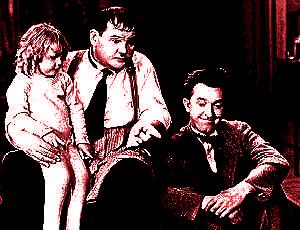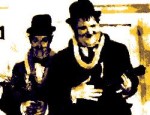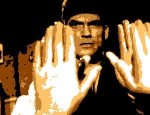Film Review
Laurel and Hardy's second feature is something of an oddity, a
Chaplinesque melange of slapstick, social realism and sentiment that
lacks the coherence and unremitting anarchic fun of the duo's later
full-length films.
Pack Up
Your Troubles suffers from a contrived, overly developed plot,
which both restrains and hampers the comedy. There are some
deliriously funny comic excursions - the best being the sequence in
which Stan and Ollie tumble into a tank and singlehandedly round up an
entire battalion of German soldiers. But there are also some
inescapable failings - gaping holes in the plot and a plethora of
unsympathetic secondary characters who have no right being in a Laurel
and Hardy film.
The scenes in which Stan and Ollie attempt to provide a loving home for
the little girl they have taken under their wing certainly have a
poignancy that is rare for a L&H film. Whilst Ollie does the
ironing and comes close to maiming himself in the process, Stanley
allows the little girl to tell him a bedtime story, with a predictable
outcome. Although the little girl in question (Jackie Lyn Dufton)
is visibly struggling with her improvised lines, she ends up virtually
stealing the show, and what a joy it is to see her imitating the
mannerisms of our two comedy heroes.
Pack Up Your Troubles may not
be one of Laurel and Hardy's better offerings but that doesn't make it
a bad film. It takes more than a mangled plot, some inappropriate
characterisation and a deluge of sentimentality to quash Stan and
Ollie's comic abilities. The jokes may be thinner on the ground
than in their subsequent films, but when they come they are guaranteed
to hit their mark, like an Exocet missile primed with industrial strength laughing gas.
It is enough to make you pack up your troubles (in whichever
item of luggage you prefer) and smile, smile, smile.
© James Travers 2010
The above content is owned by frenchfilms.org and must not be copied.
Film Synopsis
When America enters WWI in 1917, Stan and Ollie
try to avoid being
drawn into the fray by pretending to be crippled war veterans.
Alas, a keen-eyed recruiting officer sees through their deception and
they are soon in uniform, on their way to the Western Front.
Miraculously, the boys survive the trauma of trench
warfare and after the armistice they head
back to America with a vital mission to perform. Their task is to
track down the daughter of a friend of theirs who was killed in the war
and place her in the care of her grandparents. Finding the little
girl proves to be easy enough. She is being looked after (if that
is the right word) by a bickering couple whose idea of parental care
involves beating and intimidation. Locating the girl's
grandparents is somewhat more difficult, since their surname is
Smith. Having contacted several thousands of Smiths, Stan and
Ollie are almost ready to give up. They are then visited by a
child welfare officer who tells them that they must surrender the
little girl so that she may be placed in an orphanage. Appalled
by this outcome, the boys realise that they must leave town
immediately, and to do this they must find money fast...
© James Travers
The above content is owned by frenchfilms.org and must not be copied.



